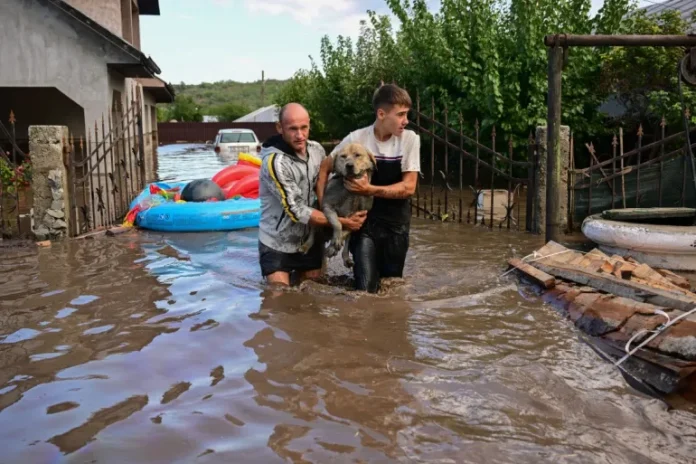Storm Boris caused widespread destruction in Central and Eastern Europe, killing at least 15 people. The storm swept across Romania, the Czech Republic, Poland, Slovakia, Hungary, southern Germany and parts of Austria, causing heavy rain, flooding and strong wind gusts.
Romania
In Galati county in eastern Romania, the hardest-hit region of the country, heavy rains caused widespread damage, affecting about 5,000 homes and leaving at least 25,000 people without electricity.
Romania’s emergency department confirmed the discovery of six bodies, including three elderly women and one man over the past two days.
Romanian President Klaus Iohannis deplored the situation, saying:
“We are again facing the effects of climate change, which are increasingly present on the European continent, with dramatic consequences.”
Rescue teams rescued hundreds of people in 19 areas of the country.
Czech Republic
In the Czech Republic, heavy rains fell for three consecutive days and flooding affected mainly northern parts of the country, leaving more than 50,000 homes without power.
Authorities reported one death, but said seven people in the country were missing, The Guardian reported.
The risk of flooding remains critical for rivers such as the Odra, Opava, Branna and Novohradka, especially in Jeseníky and Pardubice, Radio Prague International reported.
Although water levels in the upper reaches of the rivers are decreasing, the flood wave continues to travel downstream, threatening lower areas such as Uhretice and Chroustovice, the station added.
Austria
Austria has also been hit hard, with 24 villages in Lower Austria declared “disaster zones” and the death toll rising to three, the country’s vice-chancellor Werner Kogler told TV X.
“We have just received the terrible news of two more fatalities in Lower Austria,” he stated, expressing his “thoughts and deepest sympathy” for the relatives, families and friends of the deceased. He also added:
“The situation in the areas affected by the #Hochwasser (flood) remains very critical,” he warned, calling on the whole country to “follow the instructions of the emergency services on site.”
On Sunday, he said a firefighter had died battling flooding in Lower Austria after authorities declared the province surrounding the capital Vienna a disaster zone.
Chancellor Karl Nehammer noted on X:
“The Austrian Armed Forces are deployed in the storm-hit regions wherever help is needed.”
Rail services in the eastern part of the country were suspended and several metro lines in Vienna were closed due to the threat of the overflowing river Wien, APA news agency reported.
Poland
One person has drowned in Poland’s Kłodzko region, bringing the country’s death toll to five, Polish Prime Minister Donald Tusk said.
He said on X:
“I have ordered the Minister of Finance to prepare funds for emergency aid and flood damage removal. The Minister for European Affairs will apply for European aid.”
He said he had asked the defence minister to “deploy additional forces to the threatened areas.” The Polish prime minister also added:
“After consultations with the relevant ministers and services, I have instructed to prepare a Council of Ministers resolution on the introduction of a state of natural disaster.”
According to The Guardian, around 1,600 people have been evacuated in Klodzko.
Because of all this, Warsaw is expected to declare a state of natural disaster, although it has not done so during previous difficulties such as the COVID-19 pandemic or major floods in 1997 and 2010, Polish Radio reported.
Hungary
In Budapest, officials have raised the forecast for water levels in the Danube River to rise to 8.5 metres (27.9 feet) in the second half of this week, nearing the record high of 8.91 metres recorded in 2013, The Guardian reported.
Zoltan Kovacs, the spokesperson for Prime Minister Viktor Orbán, said on X:
“Amphibious tracked vehicles are en route from Szentes to Pilismarot to support flood defense efforts. The Hungarian Defence Forces are playing a key role in the flood protection efforts, deploying various equipment. Nothing is more important than the safety of the Hungarian people.”
Slovakia
Concern has been mounting in the Slovakian capital of Bratislava, where authorities have been taking protective measures to contain the surging waters of the Danube. Police have extensively “warned the public about the danger” of walking along the river, a Bratislava Police spokesperson told CNN on Monday.
Extreme rainfall events are likely to become more frequent and intense as the planet warms, science shows.
An analysis of a 2021 heavy rainfall event in Europe, in which more than 200 people were killed, found human-caused climate change had increased the likelihood and intensity of these events in the region. The World Weather Attribution initiative — a group of scientists who study extreme weather and published the analysis — concluded “these changes will continue in a rapidly warming climate.”
